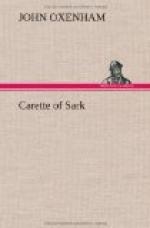“It is true,” he said gloomily. “I am sorry. It slipped out.”
“But he is Torode, and you called him Martel, and I am Phil Carre.”
“All that; but, all the same, it is true, mon gars. He is your father, Paul Martel.”
“I have always been told my father was dead.”
“We believed so. He went away twenty years ago, and never came back. We believed him dead—we wished him dead. He was better dead than alive.”
“I don’t understand,” I said doggedly, still all in a maze. “You call him Martel, and say he is my father, but I am Phil Carre.”
“Yes. We were sick of Martel, and sick of his name. We did not wish you to be weighted with it.... Now see, mon gars, I was in the wrong to slip it out, but—well, there it is—I was wrong. But, since it is done, and we must keep it to ourselves, I will tell you the rest. You are old enough to know. And Carette—eh bien! it is you yourself, and not your father—”
“Ma fe, one does not choose one’s father,” said Carette, and slipped her hand through my arm, and clung tightly to it through all the telling.
And George Hamon told us briefly that which I have set forth in the beginning of my story. We two talked of it many times afterwards, and it was at such odd times that he told me all the rest. And I think it like enough that you, who have read it all in the order in which I have written it, may long since have guessed that thing which had puzzled me so much—Torode’s strange sparing of my life when he murdered all my comrades. But to me, who had never known anything of my father, and had grown to know myself only as Phil Carre, the whole matter was amazing, and upsetting beyond my power to tell.
“And what are we to do now, Uncle George?” I asked dispiritedly, for the sudden tumbling into one’s life of a father whom all honest men must hate and loathe darkened all my sky like a thunder-cloud on a summer day.
“If he dies we will bury him here and in our three hearts, and no other must know. It would only break your mother’s life again as it was broken once before.”
“And if he lives?” I asked gloomily, and, unseemly though it might be, it was perhaps hardly strange that I could not bring myself to wish anything but that he might die.
“If he lives,” said Uncle George, no whit less gloomily—and stopped in the slough.... “I do not know.... His life is forfeit ... and yet—you cannot give him up ... nor can I.... But perhaps he will die ...” he said hopefully.
“And I shall have killed him.”
“Mon Dieu, yes!—I forgot.... But you did not know, and if you had not he would certainly have killed you ... and Carette also, without doubt.”
“All the same—”
“Yes, I know,” he nodded. “Well, we must wait and see. I wonder now what Philip would do,”—meaning my grandfather, in whose wisdom he had implicit faith, as all had who knew him. “I’m inclined to think he would give him up, you know. He would never loose him on the world again.... However, he may die.”




